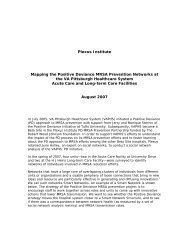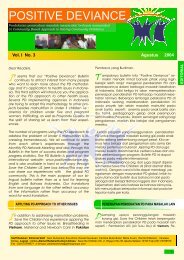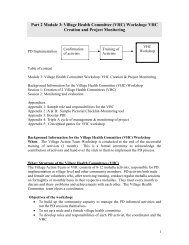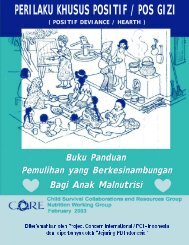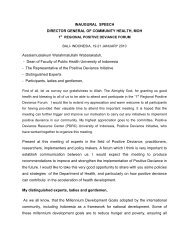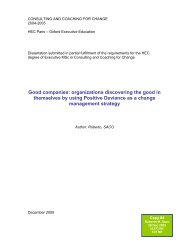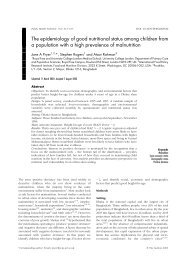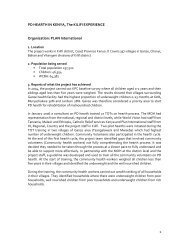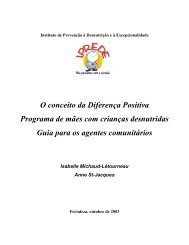F&N Bulletin Vol 23 No 1b - United Nations University
F&N Bulletin Vol 23 No 1b - United Nations University
F&N Bulletin Vol 23 No 1b - United Nations University
Create successful ePaper yourself
Turn your PDF publications into a flip-book with our unique Google optimized e-Paper software.
Toward better compliance with iron–folic acid supplements<br />
form of an EDM (fig. 2). When a woman procures<br />
supplements from the sources mentioned above, her<br />
family members play a major role in permitting or<br />
supporting her to consume them. It is more common<br />
for the family members not to have any objection to<br />
the woman’s consuming the tablets. In a few cases,<br />
a mother-in-law may persuade a woman not to take<br />
the supplements because of cultural beliefs, such as<br />
that the tablets are “hot” and may cause miscarriage,<br />
and as a result, the woman never takes the tablets.<br />
The women often forget to take the tablets regularly<br />
and may stop consuming them altogether if there<br />
is no one to encourage them at home. If a woman<br />
is self-motivated to consume the tablets regularly,<br />
she may experience benefits or side effects, which<br />
would ultimately make her decide whether to continue<br />
or discontinue taking the tablets. Experience of benefits<br />
motivates the women to continue with the iron<br />
supplementation.<br />
Agreement between reported and actual behavior<br />
Because the study was conducted on a free-living<br />
population and consumption of the supplements was<br />
not supervised, the EDMs were developed primarily<br />
on the basis of behavior reported during fortnightly<br />
home visits. However, the data were verified by crosschecking<br />
information with family members and performing<br />
regular tablet counts. Further, the data on<br />
positive changes in the women’s hemoglobin levels<br />
and the increasing proportion of the pregnant women<br />
69<br />
experiencing benefits suggest there was not much<br />
difference between reported and actual behavior.<br />
Perceived and experienced benefits and side effects<br />
Compliance with consumption of the supplements was<br />
directly related to benefits perceived by the women,<br />
which in turn were those experienced by them. Nearly<br />
70% of the 36 women interviewed felt that the tablets<br />
gave them strength (shakti aape). The 86% of the 36<br />
women who regularly consumed the tablets said that<br />
they experienced several benefits, and that was the<br />
reason given for regular consumption. A third of them<br />
stated that they were able to eat food regularly (khorak<br />
levay chhe), that their bodies remained healthy (sharir<br />
tandurust rahe chhe) due to tablet consumption, and<br />
that the tablets improved the quality of their blood<br />
(lohi no sudharo thay). Five women said that they felt<br />
strong enough to do household work (kam karvanu<br />
mann thay chhe) as a result of regular tablet consumption.<br />
However, despite the availability of tablets and<br />
some awareness of their importance, the women gave<br />
variable responses as to the number of tablets consumed<br />
(table 2).<br />
Only 5 of the subsample of 20 women who received<br />
fortnightly home visits complained of side effects<br />
during the counseling period. These discomforts<br />
included constipation, mild nausea, and sometimes<br />
vomiting. It is interesting that after counseling, three<br />
women continued to take the tablets despite their<br />
discomfort, because at the same time they experienced<br />
FM: Family member(s)<br />
IFA: Iron–folic acid supplements<br />
PW: Pregnant woman<br />
AWW: Anganwadi worker<br />
Frequent response (>50% of subjects)<br />
Infrequent response (




